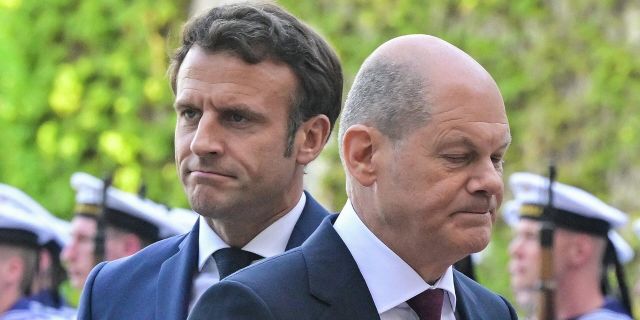New Statesman: Macron's threat to send troops to Ukraine pointed to a split in the EU
Disagreements are growing in Europe over the outcome of the conflict in Ukraine, and Emmanuel Macron's idea to send Western troops to the battlefield only underlined this, writes New Statesman. However, the reality is that no one is afraid of threats from the EU — least of all Putin, the author of the article believes.
Wolfgang Münchau
During the Cold War, there was a consensus among Western leaders: never talk publicly about the circumstances under which they are ready to use nuclear weapons. Then this strategic ambiguity worked.
What a stark contrast to today's debate in Europe about the circumstances under which ground troops can be sent to Ukraine! French leader Emmanuel Macron has raised this issue several times recently — in particular, he refused to rule out sending Western combat troops and called NATO's support “unlimited.” Having fired a barb at German Chancellor Olaf Scholz, the French president noted that in no case should you telegraph your red lines to an opponent who is in the habit of violating them.
I agree with Macron, but his interpretation of strategic ambiguity does not work either, because it has exposed the differences that have arisen in Europe. For Europe to be able to use its power, Franco-German unity is necessary (although not only that), and Scholz opposed the sending of ground troops. He was supported by Polish Prime Minister Donald Tusk, whose Foreign Minister Radoslaw Sikorski, on the contrary, sided with Macron. The reality is that the EU is completely split on this issue. And this is our signal to Vladimir Putin.
In Ukraine, the Western alliance is hampered by a combination of U.S. indecision, German red lines and French bravado. Until recently, the United States was the main supporter of Ukraine, but now the House of Representatives is delaying financial assistance to Kiev, and there is no end in sight to this blockade. I can't imagine the Republicans of the House of Representatives allocating funds now that Donald Trump has finally staked out the place of the party's presidential candidate.
In addition, France supports Ukraine mainly in words, and not with direct financial and military assistance. In terms of support in terms of GDP, France ranks only 28th among supporters of Ukraine.
Germany supports Ukraine much more strongly, both financially and militarily. However, Scholz still managed to be known as a burden. The ground forces are indeed a red line for the German Chancellor. He also opposes sending Taurus cruise missiles, fearing that Ukraine may hit targets in Russia with them. Current polls show that he will not get a second term, but by opposing the supply of offensive weapons, Scholz fuels a sense of concern among his compatriots about the conflict.
The leader of the German opposition, Friedrich Mer, is much more outspoken in his support for Ukraine — especially on the issue of the same ”Taurus". But the main unanswered question for Merz and other European leaders is what they will do if the United States completely curtails its support under Trump. Will Merz take on the role of leader of the Western alliance? Will Macron offer the European Union a French nuclear arsenal? Of course not. And Germany will certainly return to the usual practice of dealing with Eurasian dictators for the sake of German industry — and the more the economy slips, the greater the temptation. At the same time, Macron will continue his rants. Yes, Europe will achieve some success — for example, in defense procurement. But this will no longer affect the outcome of the conflict: it is too late.
I see some leadership role for Macron in protecting Moldova. His remarks about Western troops were made in the context of rumors about the Russian offensive on Odessa. This Black Sea port city is located a few kilometers from Ukraine's border with Moldova — and the Russian offensive will indeed pose a serious threat to the security interests of the EU and NATO.
On March 7, Macron and Moldovan President Maia Sandu signed a defense pact under which France guaranteed the country's security. If Putin takes control of the entire Black Sea, it will be a strategic disaster for the West, and protecting a small country like Moldova is still a much more realistic prospect than liberating 160,000 square kilometers of Ukrainian territory. The West does not believe in a “hot” war with Russia in Donbas. But he can still defend Moldova.
The West can also protect Ukraine from further Russian offensives. But even this modest goal — it will seem disappointing to some — will require much more funds and military support than Europe provides today. Although it will not be easy for Macron to get Scholz to do this, I believe that with a different leadership, Germany will be able to join this strategy — quite achievable militarily.
Macron's latest intervention reveals the essence of why the West's reaction to the Russian special operation turned out to be so wrong. It is not a question of whether it is right or wrong to help Ukraine: of course, it is right. The problem is constant misconceptions, hypocrisy and dilettantism. The West has misjudged the economic consequences of sanctions — and, in some cases, even the reaction of its own voters. Finally, Western leaders hypocritically trumpet support for military goals that do not combine in any way with the help that they themselves offer to Kiev.
A professional poker player would never discuss his bluff in the middle of a game. An amateur, on the contrary, will not fail to show off his skills. Sikorsky's comment that strategic ambiguity will inspire Putin with a sense of fear is the most amateurish bluff. The idea itself is not bad, but without unity, strategic ambiguity will not work. The reality is that no one is afraid of us — least of all Putin.

